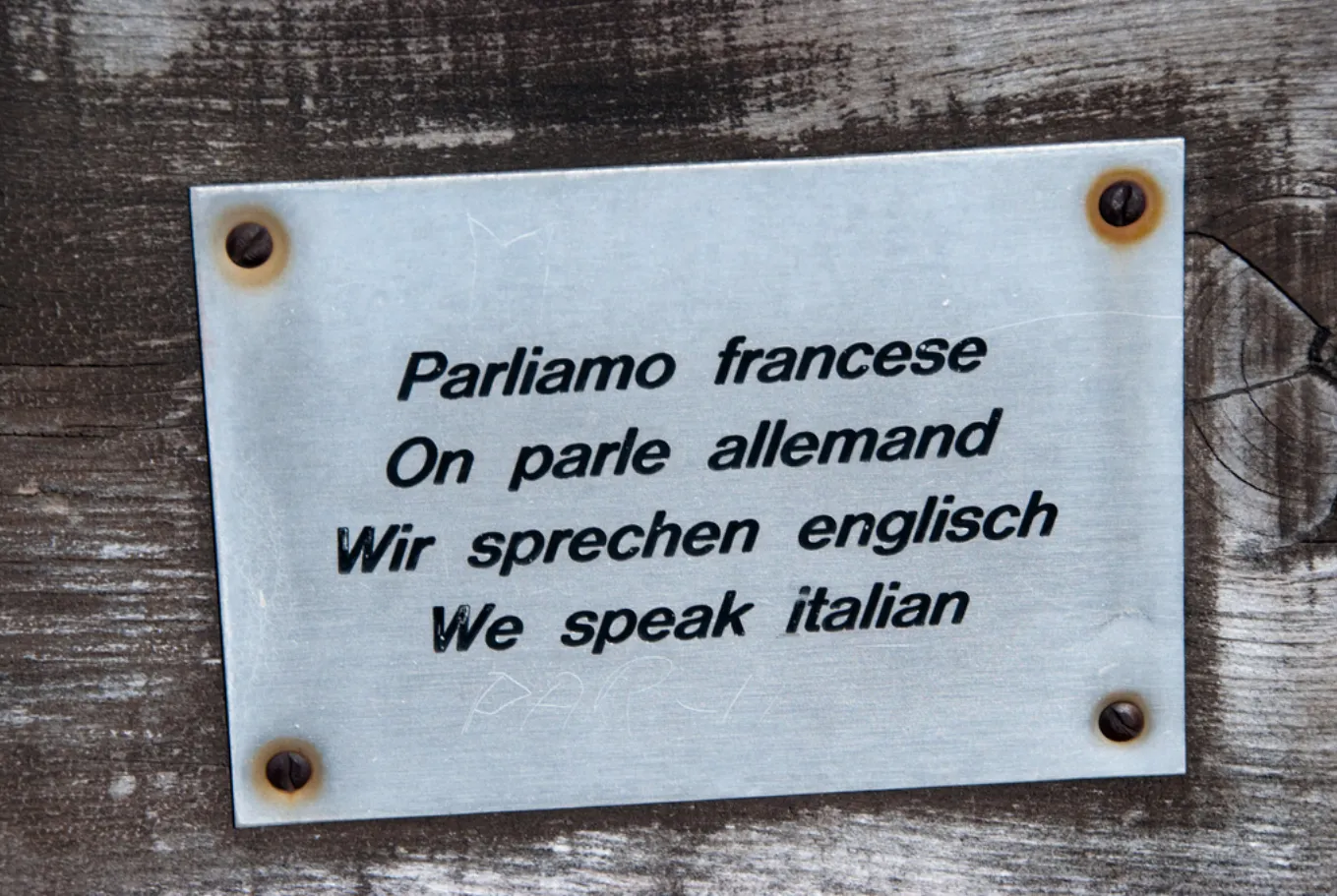You’re never too old (or too young) to become a polyglot!
I met a thirty-something gentleman last year who arrived in North America five years ago. We conversed in English—his fifth language. He was born in the Middle East, and grew up with Kurdish, Arabic and Farsi. Ten years ago he moved to Cyprus and mastered Greek. When he crossed the Atlantic, he conquered the Queen’s tongue.
What I found most intriguing about the man, was his remark when we parted ways, “You know what I’m going to learn next, sir? Spanish and French.”
There was no doubt in my mind that he would do exactly that.
It never ceases to intrigue me, when monolinguists comment, “You speak with a strong accent.” A bi- and multilingual invariably asks “What other languages do you speak?” (The latter’s philosophy is—never mind the accent, you speak my mother’s tongue—let’s talk!)
Conversing in another language (other than English) is not only for “other” people. The benefits may surprise you. And, if you are bilingual—it’s time to consider # 3. “Noooo …” you say. It’s too difficult. So is 50 pushups without rest. You start with one, then five … and keep practicing. The secret is practice and persistence.
Would you like to improve your memory? Learn a foreign language!
What happens when you learn a new language?
1 | Learning another language, or using more than one daily, sculpts your brain.
The effect on the brain is similar to exercise. Due to neuroplasticity—an increase in white matter (WM) and synaptic connections take place. It increases the size of your brain! Sorry, the size of your brain.
Language learning induces white matter changes that enhance sensory-motor connections.
Lifelong bilingualism may contribute to cognitive reserve (CR) in normal aging—decreasing white matter decline.
It staves off Dementia and Alzheimer’s disease. For monolingual adults, the first signs of dementia appear at age 71.4. For bi- or multi linguals it is 75.5.
2 | It improves your learning, memory, and intellect.
Not only does it improve synaptic growth, it improves connectivity. Increases brain density (mass) increases. Studies have shown bilingual children develop a better working memory—the ability to hold, process and update information.
3 | You become more perceptive.
It broadens your worldview, especially when you visit different countries and use the language. It improves your understanding, insight, and empathy of older cultures and its peoples. You become a better-rounded individual. You learn to better observe your surroundings. You develop your perceptual sensitivity with unfamiliar things.
4 | Puts you ahead in your career.
Improves your self-confidence. This leads to job opportunities. Yes, it makes you smarter—especially when you switch daily between languages, your brain improves its connectivity. Improves your decision-making skills. You improve multi-tasking skills. It improves the functionality of your brain by challenging it to recognize, negotiate meaning, and communicate in different language systems. It boosts your ability to negotiate meaning in other problem-solving tasks as well.
5 | It can help you make better financial decisions.
You will likely be more risk-averse. It may be intuitive that people make the same choices regardless of the languages they use. However, studies have shown, using a foreign language reduces decision-making biases—it makes you more cautious.
6 | You earn respect in a foreign land or in your own country under other population groups.
Many cultures honor an “outsider” who can speak their mother tongue. Point is—I don’t care that you speak with a heavy accent if we can understand one another—it is absolutely great! The differences between the ability to communicate and have perfect command of a foreign language are in the eyes of the beholder. You honor me, having learned my language. I will show my appreciation!
7 | Anti-aging—you are never too old to start.
Mental exercise such as learning a new language keeps your brain healthy in old age. It slows down the loss of connectivity and degeneration of white matter when combined with regular exercise and healthful eating habits.
8 | You can skip the “missing in translation” part.
So much idiom, expressions, proverb, and meaning can be lost in translation—leaving you poorer of the experience. You may discover such a richer treasure if you can enjoy the literature, poetry, and history of a country in the original tongue.
9 | It improves your first language.
By learning a second and third language, your mother tongue can improve as a result, through expanding your vocabulary.
10 | It develops in you a sense of curiosity.
That is a sure-fire way to learn (almost) anything. Never lose your sense of wonder. Be inquisitive. Be passionate.
And a BONUS:
11 | Make it easier to get exactly what you ask for, without embarrassing yourself. For e.g., to order an ice-cold beer without a hiccup. (Una cerveza muy fria, por favor)
Bilingualism influences executive and social functions, but the way in which it does so is subtle and selective. Multilingualism takes it one step further. E.g. in Luxemburg, where citizens all use at least three languages on a frequent basis, viz. French, German & Luxemborgish.
Early bilingualism usually takes place because of parental choice and societal pressure. Late bilingualism on the other hand, is often influenced by personal choice.
Does bilingualism lead to cognitive differences, or do differences in cognitive ability and social class lead some individuals to become bilingual while others do not? A good question—the jury is still out on this one.
There are monolinguals, bilinguals, multilinguals (polyglots) and on the extreme of the spectrum, the hyperpolyglots. Emil Krebs, a 19th century German diplomat, apparently spoke 65 languages by the time of his death. Perhaps it’s one too many?
What’s holding you back?
How can one learn another language?
(Learning another language is more than learning vocabulary and grammar. Learn and adopt proven techniques. Practice. Persist. Then enjoy.)
- Follow the “no English-rule.” Live lessons with humans! If you can go abroad for two to three months, this may proof to be even more effective.
- Befriend someone who speaks a foreign language. Again, follow the no English rule.
- Listen to the radio, to music, TV and watch movies in the language you’re learning. Learn songs in that language. Read books in that language.
- Courses at your local library or bookstore, e.g. in Winnipeg: McNally Robinson
- Language courses, such as Rosetta Stone or Pimsleur Approach. Read the fine print—it can be expensive. Not all courses are created equal.
- See what Tim Ferriss’s take on learning a language is. (The 4-hour work week, The 4-hour body.)
Remember, learning a second and third language (when you’re an adult) is hard work. It requires diligence and motivation. Then again—what in life is worthwhile that doesn’t require time and effort and (some money.) Of which effort is the greatest. It can and will open up doors for you, you didn’t realize existed!
Just as important is to remember—the brain is a highly adaptive organ. Never underestimate what yours is capable of. Don’t give yourself so little credit! You can learn to build new neuronal pathways. And, here’s the real fun factor—following language number two, numbers three and four become easier, especially if you learned them in your adult years. A passion for languages can be developed.
It does not matter what your occupation is or how old or young you are—learning another (foreign) language, will (literally) enlarge your brain, make you smarter, more perceptive, and may just land you a job in the diplomatic services! And, if the latter doesn’t intrigue you, make your next overseas vacation more of an adventure!
What’s holding you back?
Remember, your writing has purpose and value—not only in healing you, but, if edited and published, can be shared and help heal others. It can become a powerful tool to touch and transform your readers.
Thank you for reading! Thank you for sharing!
References:
- Neuroimaging of the bilingual brain: structural brain correlates of listening and speaking in a second language. Brain and language. 2016.
- Gold et al. Lifelong bilingualism contributes to cognitive reserve against white matter integrity declines in aging. Neuropsychologia. 2013.
- Bilingualism, social cognition and executive function: a tale of chickens and eggs. Neuropsychologia. 2016.
- The personal active aging strategies. 2016.
- Effects of physical exercise combined with nutritional supplements on aging brain structures and function. Front Aging Neurosci. 2016.
- Therapies for prevention and treatment of Alzheimer’s disease. 2016.
- 9 Surprising health benefits of learning a foreign language. Olly Richards.
- The Telegraph. Benefits of bilingualism. 19 June 2013.
- The foreign-language effect. Thinking in a foreign tongue reduces decision biases. Psychological science. 2012.
- Medical Daily. The brains of polyglots.
© 2016 DanieBotha.com. All rights reserved.
visualhunt.com – IMG – Magdalar


